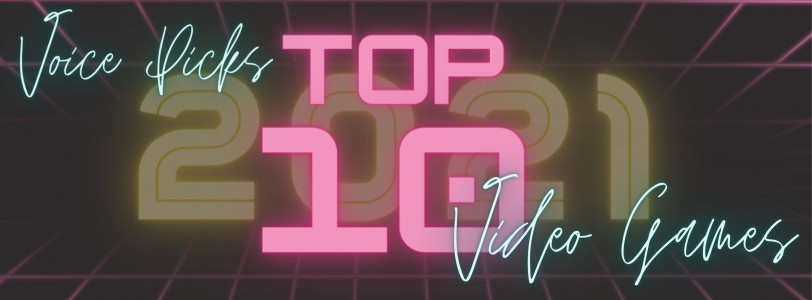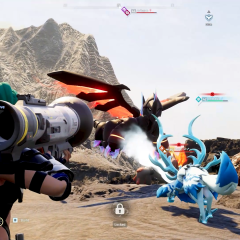This has been a tremendous year for video games. There was something for everyone, excellent sequels to much loved franchises, sparkling original titles that filled niches we didn't know existed, and a whole host of artful indie games. Above all else, 2021 proved that originality is far from dead in video games, with even the franchise games providing new levels of innovation. Join us as we break down some of our favourite gaming releases this year.
Ratchet & Clank: A Rift Apart
Narrowly edging out New Pokemon Snap for a spot on this list, Ratchet & Clank: A Rift Apart is a fun, fresh instalment to the series. There's no possible way to talk about this game without mentioning the graphics; it is visually stunning. One of the best-looking games on the PS5 to date, Ratchet & Clank has always taken a creative approach to its world designs, with wacky architecture and sprawling, metallic environments, it's always been a bit of a visual treat running through these game, but now it is the primary draw of the game as story and character-wise, it doesn't break any molds. A bit sappy at times, to the point of banality, there are still fun moments, particularly from the game's villain, who is barely evil, even by cartoonish standards, even giving his robot henchmen paternity leave at one point. The combat is a blast, with a collection of over the top weapons that, despite all being pretty much the same in terms of effectiveness, decorate the set pieces with a delightful level of chaos.
Deathloop
From the creators of the Dishonoured series comes this Groundhog Day style action-stealth game that dumps its protagonist on an island, telling them that they need to assassinate eight individuals by midnight to escape. If you die, or leave one alive, you travel in time back to the beginning of the day. At first you'll most likely go the classic stealth game route, using your character's various abilities to sneak past enemies and snipe every target you can get a sightline on. Eventually though, the game becomes less of a challenge to complete, and more of an exercise in inventiveness. When you reach a point where you can blast through the island, parkouring your way past obstacles and cutting through the army of henchmen, that's when the game truly shines. It's a smart gameplay loop (no pun intended) that encourages the player to have as much fun as possible.
Halo Infinite
This year was the 20th anniversary of Halo: Combat Evolved, which launched on the very first Xbox in 2011. Originally made by Bungie, Microsoft created 343 Industries to carry the game on after Bungie went independent. 343’s efforts to date have been mixed, with Halo 4 putting in a good effort and Halo 5 being largely maligned. Halo Infinite, therefore, had a lot of expectation resting on its shoulders. Built in a new game engine, with an open-world format, Halo Infinite really hits the mark. It’s by far the best playing Halo to date, with a polished combat system and really balanced encounters that are tough but fair. The story is acceptable but nothing great, however the team have said this is the foundation of the next 10 years of Halo, and I’m personally exceptionally excited to see what comes next. It was definitely worth the year delay. Oh, and the multiplayer is fantastic, and with 343 committed to sorting out the battle pass fiasco, I think Halo is finally in a great place.
Chicory: A Colorful Tale
Not the most obvious of inclusions at first glance. Chicory looks a lot like one of those fun little flash games you'd play on the computer to procrastinate – pick up, put down, that's all. But Chicory is so much more than that. It's a top down puzzle/adventure game in which you take control of a dog janitor (a janitor that is a dog, not a janitor that cleans up after dogs) who is the number one fan of Chicory, an artist that wields a magic paintbrush that colours in the otherwise entirely black and white world. After Chicory vanishes, the colour does too, and you're left with the task of colouring in the world. It's a wildly inventive central mechanic, allowing you to change the world around you at will, painting it with whatever colours you like. It's a joyous sight to behold, splashing paint across such a vibrant canvas, and makes every puzzle satisfying to solve, even when you're feeling stumped. The growing complexity in your tools gives the game a much-needed sense of progression and rising stakes, and truly elevates it from being a simple gimmick. So too does the gradually more immersing story. Themes of imposter syndrome, and the constant pressure of being evaluated are explored delicately as you progress. All these concepts are handled with care, and presented to us through quirky, lovable characters. If you're looking for the quintessential relaxed gaming experience of 2021, this is it.
Hitman 3
The tumultuous conclusion to IO Interactive's three-part take on the Hitman franchise, Hitman 3 pretty much serves as a confirmation that IO know exactly how to make a Hitman game. Step 1 — The story. The franchise has always had three or four plot points, and Hitman 3 sticks to this formula like glue. It's exciting, if predictable, but the story really isn't something you play the game for. Step 2 — The maps. Now this is something that IO does exquisitely. Each level consists of a distinct location, from mountain-based private hospitals to gloomy English manors, populated with a ton of deadly tools and civilians loudly discussing exploitable flaws in infrastructure. The vistas are stunning, and give every map a unique feel that makes returning to them a hugely enjoyable experience. Seriously, this game is replayable to the nth degree. Step 3 — The assassinations. This is what you play the game for. There is so much variation it's honestly ridiculous. You can play it like the consummate professional Agent 47 is supposed to be, all silencers and tailored suits, or you can play it like an absolute madman, charging in dressed as a clown and smacking your target over the head with a didgeridoo and legging it before their bodyguards can process what just happened. The best way to play though, in my opinion, is carefully setting up a series of events and watching them all trigger each other like some sort of murderous Rube Goldberg device. Now that's the Hitman way.
Resident Evil: Village
Resident Evil: Biohazard brought originality to an age-old franchise that sorely needed it. Its follow-up for this year, Resident Evil: Village doesn't quite live up to that explosive revitalisation, but it's still a wild ride. First person survival horrors need to be banned as health risks, as Village is far too immersive for its own good. Every jumpscare sends waves down the player's nervous system. The myriad of tense, heartstopping moments during Ethan's journey through the twisted village are enough to make you set down your controller and vow never to play a game more stressful than Chicory ever again. It does a great job of never letting you feel like you're on top of things. Every time a minor victory is had, something even more monstrous storms round the corner and charges at you. Your combat options are just enough to keep you alive, and on the whole there is far more action to be had in this game than in Biohazard, but when you're up against the most dangerous enemies your only desire is to leave them behind. Fans of the franchise will not be dissapointed.
Sable
Sable is a wonderfully personal experience. Its post-apocalyptic world entices the player to explore quiet, sandy corners, rendered beautifully with stylish cartoon landscapes and environments. Taking a very indie approach to game design, there is little conflict or grand stakes to be found in Sable, you are simply playing as a young woman searching for her calling in life. No to-do lists or intrusive markers railroad you through the open world; it's entirely up to you where to go and what to do. There is some subtle guidance — after all, being hopelessly lost can be just as discomforting as being overwhelmed — but there is never a feeling of playing the game 'wrong'. Anything you do, whether it's immersing yourself in a new village, tinkering with your hoverbike, or simply jumping up and down sand dunes, it all feels right. Sable has this captivating way of making its world feel old, worn down by an age of complete stillness. This makes it easier for the game designers to nudge you on your way; anything that breaks the serenity of the desert draws you in. Barring some technical issues, this is the most well-crafted open world of the year.
It Takes Two
Perhaps the strangest entry on this list, It Takes Two is a two-player platform adventure game centred around a couple on the cusp of divorcing being transported into the bodies of their daughters favourite dolls, and subsequently trying not to be stuck in the bodies of their daughters favourite dolls. Gameplay-wise it's phenomenal. 3D platforming is hard to get right (if your name isn't Mario), but It Takes Two manages to give the players enough movement options to always feel in control. Set-backs invariably occur because of the players' own fault, rather than the game's. The complementary abilities of the two protagonists make the co-op elements feel fully intertwined with the game design, rather than a tacked on element. The dialogue could have used a bit of proofreading, it somehow comes across as either too disinterested or too enthusiastic at several points in the game, but seeing as you're playing it with a partner, you're unlikely to be paying too much attention to this anyway. That isn't to say the game isn't attention-grabbing – many of the scenarios the unfortunate married couple find themselves in are utterly ludicrous, with some bizarre moments of high-stakes hilarity. The core family dynamic both helps and hurts the story in certain ways, but It Takes Two is well worth the time it takes to play it.
Metroid Dread
19 years. It took 19 years for Metroid: Fusion to get a follow-up. If anything Dread deserves a spot on this list for the sheer audacity of sauntering onto consoles almost two decades after its predecessor was released. Samus has had a number of spin-off adventures since then, but Dread finally marks the conclusion of a saga that began with the original Metroid in 1986, and it is very, very lucky that it manages to live up to that millstone around its neck. The series has always had a concern with terror bubbling just under the surface, with some of the most evocative foreboding music in gaming history. By captioning their game Dread the developers of Samus Returns promised to bring that tonal fear right to the surface. There's no better example of that idea than the E.M.M.I, terrifying, unstoppable robots that hunt Samus down relentlessly. They have the creepiest way of moving I've ever seen, with smooth, fluid motions that betrays their murderous intent. The ability to counter enemies makes a comeback from Samus Returns, and whilst it's an engaging and useful ability normally, against the E.M.M.I it just adds to the sheer panic of being caught by one, knowing you have one, tiny chance to escape its clutches if you time your counter just right. Whilst Samus feels more badass than ever before, Metroid: Dread does everything it can to assail her with overwhelming threat after overwhelming threat and it is utterly fantastic.
Disco Elysium: The Final Cut
Originally released in 2019 but now re-released definitively, Disco Elysium is an inventive game that every RPG fan needs to delve into at some point. It is truly an otherworldly experience to behold, one that articulates existential struggle, addiction, mental health issues and diverse political decision making, all entrenched in a way that is otherwise unparalleled in gaming. You play as Harry Du Bois, a depressed, alcoholic and amnesiac detective who is thrust into a world he has no memory of and has to solve a case, either by becoming a straight-cut cop or a bumbling idiot. One of the most impressive aspects of this title is the sheer amount of voice lines found within, a staggering 350,000 detailed lines were recorded by jazz musician Lenval Brown, who voices our protagonist’s (or antagonist’s) own thoughts, as well as narrations for the majority of interactable objects within the world. Brown is joined by a range of other incredible voice actors, and they, alongside the stunning steampunk-esque, oil painted-style of the visuals, and melancholic score from band British Sea Power, expertly bring the fictional city of Revachol to life.
The game is almost endlessly replayable, you could end up choosing the path of drug addled communist preacher or a moralist living in a dumpster. Alternatively you could follow fascism or ultraliberalism, all decisions made will drastically impact the direction of your storyline. Disco Elysium’s isometric style gameplay consists of walking around the district of Martinaise, questioning and helping those around you, and uncovering your own reality by passing or failing checks based on the skills you choose. The game is by no means easy, wrong choices can result in physical or moral death and a complete game reset, and there is a whole lot of reading and world building to sink your teeth into, so patience and concentration is paramount. Disco Elysium is an utter masterpiece, and I highly recommend this definitive version of it to anyone who is willing to immerse themselves in a twisted, dystopian world full of intrigue, politics and expressionism.









0 Comments